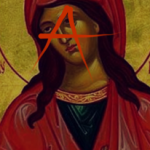We choose one facet of God’s character to emphasize and erase the rest of God’s infinity in the process…

Then in our eyes, God becomes only wrath, only a judge, only a conqueror, and all the other aspects of God that make God who God is are lost, because we don’t have any more room in our field of vision to see the rest of who God is. These condensations of God’s character into just one or two things ultimately reduce God to a lesser form of who God really is, at least in our minds, and I might even daresay that it’s idolatrous.
If you think about it, that’s how all the mythological gods of ancient Rome and Greece were regularly portrayed, as being simplistic and one dimensional, wholly different from the Christian God many claim is infinite and bigger than any of the pagan gods, where Hermes was the trickster, Artemis was the warrior, and Athena was the wise.
Perhaps this was because, similarly with today, it was difficult to conceptualize a single being that could be all things, as we as Christians claim to believe.
Perhaps this was the reason for the Greek pantheon of gods, because it was easier to understand the existence of discrete, individual gods who only had their one temperament or one role to play.
And perhaps, to a certain degree, this is the reason that a common rebuttal among Christians who don’t agree with one another is that they believe in “a different God,” simply because they happen to see God in a different light.
Perhaps that phrase means that the other doesn’t see God as being loving enough or disciplinarian enough or angry enough, but one of the quickest critiques is the assumption the other person doesn’t believe in the same God due to their disagreement.
But perhaps they aren’t looking at different Gods, but rather different facets of the same God they’ve chosen to emphasize, because again, it would be foolish to think our human minds can perfectly comprehend the wholeness of God all at once.
So, by necessity, we as humans need to emphasize one part of the character of God at a time in order to have some semblance of a grasp of who God is. And the part we emphasize or the metaphors we use to understand the different aspects of God will requisitely influence everything forthcoming from the lens and angle through which we view God.
This is why the vantage point from which we view God is so powerful…















